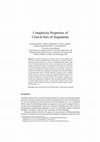Papers by Mikołaj Podlaszewski
The current implementation provides a demonstration of a number of basic argumentation components... more The current implementation provides a demonstration of a number of basic argumentation components that can be applied in the context of multi-agent systems. These components include algorithms for calculating argumentation semantics, as well as for determining the justification status of the arguments and providing explanation in the form of formal discussion games. Furthermore, the current demonstrator also includes the first implementation we know of regarding argument-based judgment aggregation theory.
Journal of Logic and Computation, 2014
ing.unibs.it
With this demonstrator, we present an implementation of abstract argumentation theory that is not... more With this demonstrator, we present an implementation of abstract argumentation theory that is not only able to evaluate an argument according to standard argumentation semantics, but is also able to engage in a discussion to defend its answer. This discussion is formal yet ...
In this paper, we define a labelling-based justification status of the arguments in an argumentat... more In this paper, we define a labelling-based justification status of the arguments in an argumentation framework. Our proposal allows for a more fine-grained notion of a justification status than the traditional extensions-based approaches. In particular, we are able to distinguish different levels at which an argument can be accepted or rejected. Our approach is fully compatible with traditional abstract argumentation in the sense that it works on standard argumentation frameworks and can be implemented using existing argumentation-based proof procedures.
Proceedings of the 26th Benelux Conference on Artificial Intelligence (BNAIC 2014), 2014
We continue recent work on the problem of aggregating labellings of an argumentation framework by... more We continue recent work on the problem of aggregating labellings of an argumentation framework by adapting the distance-based framework of Miller and Osherson from binary judgment aggregation to the argumentation setting. To instantiate the framework we employ some notions of labelling- distance recently introduced by Booth et al., in the process generalising and extending some of the latters’ results. We introduce some new postulates for distance methods based on the concept of qualitative distance, and check their validity.

In an abstract argumentation framework, there are often multiple plausible ways to evaluate (or l... more In an abstract argumentation framework, there are often multiple plausible ways to evaluate (or label) the status of each argument as accepted, rejected, or undecided. But often there exists a critical set of arguments whose status is sufficient to determine uniquely the status of every other argument. Once an agent has decided its position on a critical set of arguments, then essentially the entire framework has been evaluated. Likewise, once a group, e.g. a jury, agrees on the status of a critical set of arguments, all of their different views over all other arguments are resolved. Thus, critical sets of arguments are important both for efficient evaluation by individual agents and for collective agreement by groups of such. To exploit this idea in practice, however, a number of computational questions must be considered. In particular, how much computational effort is needed to verify that a set is, indeed, a critical set or a minimal critical set. In this paper we determine exact bounds on the computational complexity of these and related questions. In addition we provide similar analyses of issues: a concept closely related to critical set and derived in terms of (equivalence) classes of arguments related through “common”
labelling behaviours.







Uploads
Papers by Mikołaj Podlaszewski
labelling behaviours.
labelling behaviours.